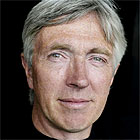The Shipman's Tale, by Geoffrey Chaucer John the libidinous monk listens sympathetically to the complaints of the merchant's wife. Her husband is a skinflint who is about to shame her for a debt of 100 franks. The monk borrows this very sum from the merchant and, when he is away on business, turns up with it. "With crowne and berd al fresh and newe yshave" he gets his way. "In myrthe al nyght a bisy lyf they lede."
"Hero and Leander", by Christopher Marlowe Hero is a chaste priestess, Leander a beautiful youth who swims the Hellespont and, naked, knocks on the door of her tower. "Treason was in her thought, / And cunningly to yield herself she sought. / Seeming not won, yet won she was at length, / In such wars women use but half their strength."
Moll Flanders, by Daniel Defoe Moll looks back on her first steps in a career of sexual opportunism. It begins with the son of the woman for whom she works as a maidservant. He starts with mere flattery, throws in a few "earnest" kisses and then thrusts five guineas into her hand. "I was more confounded with the Money than I was before with the Love" – and so "I gave my self up to Ruin."
Tom Jones, by Henry Fielding Tom saves Mrs. Waters from a would-be rapist. The couple withdraw to a nearby inn, where the lady begins to use the "artillery" of her charms upon her handsome young rescuer. At first our hero notices only the food in front of him, but when she unlooses the "handkerchief" covering her bosom, the "fair conqueror" triumphs.
"La Belle Dame Sans Merci", by John Keats Enchantment has always been a metaphor for seduction. The pale knight tells the poet how a lovely, "faery" lady has beguiled him. "She look'd at me as she did love / And made sweet moan". She recruits him to the company of all those other lost men she has seduced.
Don Juan, by Lord Byron Young Juan likes to discuss his favourite books with Donna Julia, an attractive married lady. He begins to declare his feelings and her determination that their relationship remain Platonic is rather easily overcome. "A little still she strove, and much repented, / And whispering 'I will ne'er consent' – consented". Has a rhyme ever been as inevitable?
David Copperfield, by Charles Dickens We do not exactly see the seduction of Little Em'ly by handsome, heartless Steerforth, for the young David does not understand what he is witnessing. He sees her "listening with the deepest attention, her breath held, her blue eyes sparkling like jewels, and the colour mantling in her cheeks". The trouble is that Em'ly wants to be a lady, so cannot resist a gentleman.
Jude the Obscure, by Thomas Hardy Arabella, a mistress of "the unvoiced call of woman to man", manages to seduce the luckless Jude twice. The first time she attracts him by throwing a pig's pizzle (=penis) at him as he passes in the lane (an irresistible gesture in Wessex). Then, years later, she returns from Australia, gets him drunk and seduces him all over again.
Oranges Are Not the Only Fruit, by Jeanette Winterson Jeanette has been denounced by the pastor of her church for her "falling under Satan's spell" (ie having a lesbian relationship with another teenager). She takes refuge at the house of Miss Jewsbury, another member of the congregation. Miss Jewsbury gives her some brandy, and then some reassuring caresses, and then ...
Disgrace, by JM Coetzee Gruesomely, David Lurie's seduction of his young student Melanie Isaacs is told from his point of view. He fancies himself a Byronic servant of Eros, and quotes amorous Shakespearean verse, but in fact he is a lecherous, late middle-aged academic preying on a barely compliant victim.
• What have we missed? Don't forget to add your suggestions for future 10 of the bests

